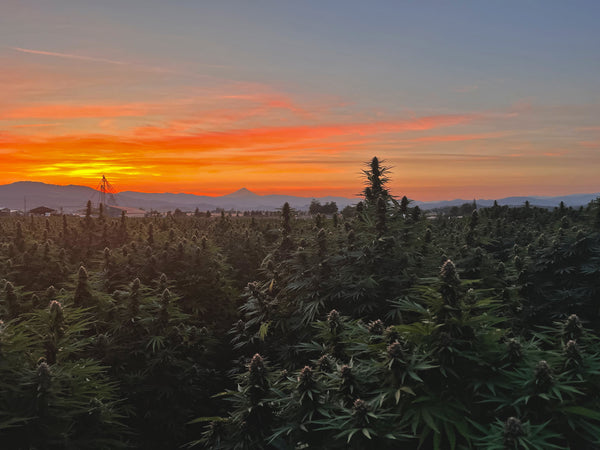
Terpene Effects: What Are Terpenes & How Do They Work?
Cannabis-derived terpenes are the result of an extraction process that distills the essence of hemp flower in its natural form. You can find terpenes everywhere, in fruit, vegetables, and plants around the world. But what are terpenes, and how can they affect you? Learn more about terpene effects and benefits when you check out this overview from the experts at Rogue Origin.
What Are Terpenes?
Before we dive into terpene benefits, the first thing we should explore is what terpenes actually are. The world has known about terpenes for quite a while, and they’re not restricted solely to hemp flower and marijuana plants.
Terpenes are an aromatic compound that you can find in many plants, like pine, lavender, and oranges. In fact, the scent that comes from some of the most fragrant plants is due to a combination of the terpenes within them. The most common terpene effect is to protect plants from grazing animals, fungi, and germs that may harm them.
So why do people only talk about terpenes in the context of cannabis? These compounds are so closely associated with cannabis and hemp flower because these plants contain such a high concentration of them.
Are Terpenes & Cannabinoids Different?

Yes! Cannabinoids are the chemical compounds found in cannabis, like THC or CBD. They’re exclusive to marijuana and hemp flower plants. However, terpenes can be found in all types of aromatic vegetation. Furthermore, terpenes aren’t responsible for any of the “high” that you experience when using cannabis. That is strictly the domain of cannabinoids.
While cannabinoids interact with your body’s endocannabinoid system to affect you, terpenes interact with a variety of other body systems. Some terpenes, like linalool, have been observed interacting with opioid and dopamine receptors.
What Are Terpene’s Effects On People?
Most terpenes are bioactive, meaning they do affect the human body. Terpene effects will vary based on the concentration in your products, as well as how you choose to use it. Some terpenes are used as the basis of essential oils for aromatherapy, others are smoked in hemp flower products, and some are eaten in gummies or added to food.
Terpenes & Cannabis
There is some research that shows that the concentration of terpenes in cannabis products can enhance the way they affect your body. Known as the entourage effect, high levels of terpene in cannabis may even alter how THC and CBD interact with your body.
While cannabis and terpenes do seem to go hand in hand, there is plenty of research that’s working on isolating terpenes and testing their effects. With so many types of terpenes out there, terpene benefits could be an untapped resource for the future.
Types of Terpenes

Many terpenes exist in the natural world, but scientists have only studied a few of them to a deeper degree. Here, we’ll cover some of the better-known terpenes and their effects.
1. Limonene
A terpene that most people can recognize by scent, limonene is what gives citrus fruits their smell. Limonene modulates the way your immune cells behave and may be used to protect your body from a variety of disorders. Some terpene benefits include:
- Anti-inflammation
- Anti-viral
- Anti-diabetic
- Antioxidant
- Anti-cancer
Limonene is currently available in a distilled form that you can take as a supplement in food and drink. It’s also naturally occurring in hemp flower.
2. Pinene
Another of the most naturally abundant terpenes, pinene, is what creates the fresh, bright scent of many evergreens, which you can find in pine needles, basil, and rosemary. There are two forms of pinene, labeled “A” and “B” pinene. Some pinene terpene effects include:
- Anti-inflammatory
- Bronchodilator
- Pain Relief
- Boost Cognitive Function
- Mood Stabilizing
You can find pinene in hemp flower cultivars like Lifter and Sour Lifter.
3. Linalool
You’re most likely to find linalool terpenes in the lavender plant, which is why it has such a rich, soothing scent. Lavender is well-known for its calming effects, which are likely caused by this terpene. Some of the other terpene effects you can expect include:
- Anti-inflammatory
- Neuroprotective
- Antidepressant
- Anti-anxiety
- Antimicrobial
Linalool is also found in citrus, birch, rosewood, and hemp flower.
4. Myrcene

Usually found in lemongrass and thyme, myrcene is also common in hemp flower plants. It’s considered a powerful antioxidant with tons of benefits. Some other terpene effects of myrcene include:
- Antioxidant
- Neuroprotective
- Anti-inflammatory
Some research also shows that in high doses, myrcene may also protect heart tissue after a stroke and prevent the breakdown of cartilage to fight against osteoarthritis.
5. Beta-Caryophyllene
You can find this terpene in vegetables and herbs, including black pepper and cloves. Like many terpenes, beta-caryophyllene has anti-inflammatory effects. Some other terpene benefits of beta-caryophyllene include:
- Nerve Pain Management
- Improve Mitochondrial Function
- Neuroprotective
- Anti-microbial
There is also some research that suggests this terpene can improve gut health and oral health.
6. Humulene
As a key component of the hop plant, humulene has a protective effect on some cells. Other plants, including clove, ginger, and hemp flower, also have significant amounts of humulene. Some terpene effects you can expect include:
- Anti-allergic
- Anti-asthmatic
- Anti-cancer
Humulene requires additional research to discover the best ways to use this terpene.
What Does All This Mean?
Terpenes are in many types of plants, including hemp flower, so it’s no surprise that researchers are exploring their potential. While they already play a role in the health of the plants in which they exist, they could also help human health thrive.
Consuming small amounts of terpenes in food is normal. Still, as research on terpene effects moves forward, you may start to see terpene products offered as alternative options to traditional medicine. Always discuss additions to your health regimen with a doctor before experimenting with high concentrations of any supplement.







